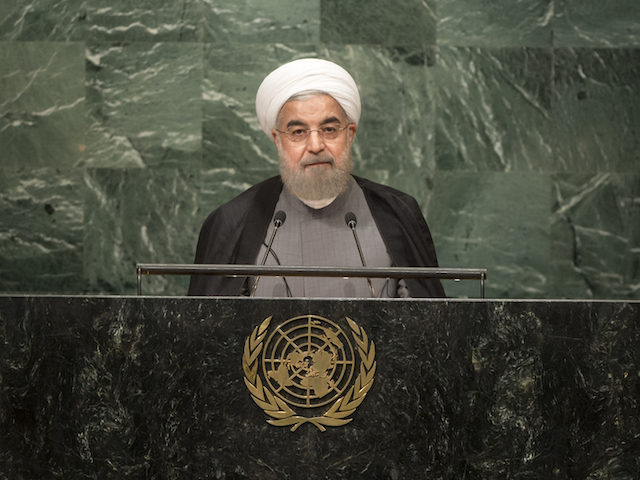Iranian President Hassan Rouhani began his address to the U.N. General Assembly by saying the “painful terrorist attack” against New York City on 9/11 “moved the entire world,” but also led to “a devastating war in the Middle East, and the spread of insecurity across the globe.”
Of course, Rouhani did not dwell on what Iranian saboteurs have been up to during that devastating war. Instead, he complained that “major powers are mainly focusing on advancing different methods of repression and military intervention under the pretext of creating a secure environment for their citizens,” quite literally blaming those major powers for the “genesis of borderless violent extremism and terrorism.”
“The terrorists even went as far as claiming to have established States in the Levant, Iraq and Libya,” said Rouhani, clearly referring to ISIS. “More unfortunately, they hide their nefarious intents behind religious literature, thus turning a compassionate religion into an instrument of violence and terror by spreading extremist and takfiri propaganda.” By calling them “takfiri,” Rouhani was essentially accusing ISIS of being false Muslims.
“Regrettably, some powers have provided covert and overt support for these takfiri groups or condoned their formation. The same powers are now committing atrocities against innocent people and their defenders under the guise of fighting terrorism,” he said.
Rouhani’s view of Middle Eastern turmoil held no apology or remorse for Iran’s actions, but he lectured Saudi Arabia at length for its “divisive policies, spread of hate ideology, and trampling upon the rights of neighbors,” lamented the “daily aerial bombardment” inflicted upon the “defenseless people of Yemen,” and also implied the Saudis were the power behind these takfiri jihadist groups.
He also slipped in a jab at Israel, declaring “the oppressed Palestinians are still afflicted by a web of apartheid policies and atrocities set by the usurping Zionist regime.”
Rouhani painted a bright picture of peace-loving Iran’s vision for a harmonious future in the Middle East:
Iran’s principled approach calls for constructive partnership with our neighbors with aview to establishing an enduring order based on shared security and efforts aimed at enhancingthe development of the countries in the region and mutually beneficial economic cooperation. To uproot violence in the region, there is no choice but to focus on promoting democracy, citizenship rights and economic development.
Iran opposes any kind of sectarianism and any attempt to promote religious gaps. The Muslim peopte, be they Shi’as or Sunnis, have and continue to live together for centuries in harmony and mutual respect. Attempts to turn religious dissimilarities into tense confrontations is rooted in vested interests of certain countries, which try to hide their quest for power covered in religious slogans.
lran considers it imperative to preserve territorial integrity of States, keep national borders intact, enhance peoples’ right to self-determination, and uphold the principle of refraining from the threat or use of force. We also reiterate the need to use diplomacy for conflict resolution.
Rouhani portrayed the Iranian nuclear deal (the Joint Comprehensive Plan of Action or JCPOA) as an example of “the success that we could achieve through moderation, constructive interaction, and the promotion of dialogue – a policy that brought a long, complicated, and unnecessary crisis to an end by adopting a win-win approach.”
One should bear in mind that he thinks everyone other than Iran created that long, complicated, unnecessary crisis. He stressed that point by denouncing the “pressures, sanctions, and illegal threats against the Iranian people, which sought to fully dismantle Iran’s enrichment program,” and boasted that the U.N. Security Council and International Atomic Energy Agency have “formally accepted Iran’s peaceful nuclear program.”
Rouhani then tore into the United States with gusto, once again making the Obama Administration look foolish for its many concessions to the regime in Tehran:
The U.S. is fully aware that JCPOA constitutes a recognized multilateral agreement, and any failure on the part of the United States in implementing it wou!d constitute an international wrongful act, and would be objected to by the international community.
Any failure in implementing the JCPOA will further erode the credibility of the United States in the world. The lack of compliance with the JCPOA on the part of the United States in the past several months represents a flawed approach that should be rectified forthwith.
Unfortunately, such illegal actions are not unprecedented: the latest case in point is the US Supreme Court ruling to seize billions of dollars of the Iranian people’s assets. This experience demonstrated that the Zionist pressure groups could go as far as having US Congress pass indefensible legislations forcing the highest American judicial institution to violate pre-emptory norms of international law.
The Supreme Court decision Rouhani attacked was a 6-2 decision allowing the victims of Iran-sponsored terrorism and their families to seize some $2 billion in assets from Iran’s central bank, as previously authorized by Congress. The plaintiff in the case was Deborah Peterson, whose brother, Lance Corporal James C. Knipple, was killed in the Beirut barracks bombing of 1983.
Rouhani said that eight months after “the removal of the cruel nuclear-related sanctions” against Iran, its economy was showing “clear improvement,” including 4% economic growth in the spring of 2016, single-digit inflation, and the restoration of pre-sanctions oil production and export.
“Currently, based on all domestic and international prediction, Iran is enjoying one of the highest growth rates among the oil-producing countries,” he boasted.

COMMENTS
Please let us know if you're having issues with commenting.